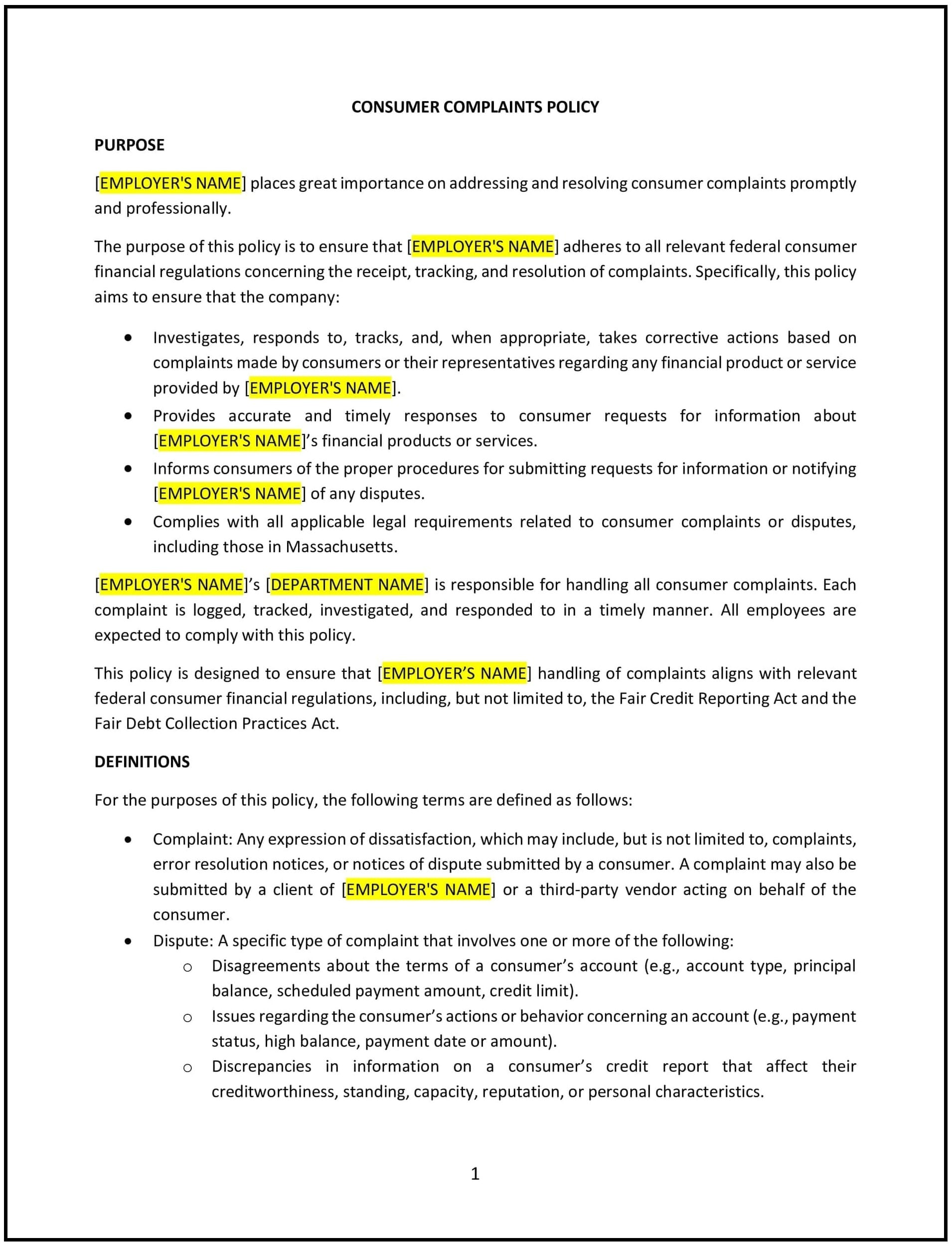Consumer complaints policy (Massachusetts): Free template
Got contracts to review? While you're here for policies, let Cobrief make contract review effortless—start your free review now.

Customize this template for free
This consumer complaints policy is designed to help Massachusetts businesses establish a clear and effective process for handling consumer complaints. The policy outlines the steps for consumers to report complaints, how the company will address these complaints, and the timeline for resolution. It ensures that the company can address customer concerns promptly and efficiently while complying with Massachusetts state laws and federal regulations related to consumer protection.
By adopting this policy, businesses can enhance customer satisfaction, protect their reputation, and strengthen compliance with consumer protection laws.
How to use this consumer complaints policy (Massachusetts)
- Define acceptable complaints: Clearly specify the types of complaints that consumers can report under this policy. These may include issues related to product quality, services rendered, customer service, billing errors, or misleading advertising.
- Provide accessible reporting channels: Establish multiple, accessible channels for consumers to submit complaints, such as a dedicated phone number, email address, online form, or physical mail. The policy should encourage consumers to report concerns as soon as possible.
- Set clear timelines for response: Outline the timeline within which the company will acknowledge and respond to consumer complaints. For example, the policy may state that complaints will be acknowledged within 24-48 hours and that resolution will be attempted within a set number of business days.
- Detail the resolution process: Specify the process for investigating and addressing complaints, including how the company will assess the issue, determine appropriate solutions, and communicate with the consumer throughout the process.
- Provide for refunds, replacements, or compensation: Outline the possible outcomes for consumer complaints, such as product replacements, refunds, or other forms of compensation. The policy should specify when these remedies are available and the process for issuing them.
- Address escalations: Define the process for escalating complaints that cannot be resolved at the initial level, including the involvement of higher management or a third-party mediator.
- Protect consumer privacy: Ensure that any personal information shared by consumers during the complaint process is kept confidential and handled in compliance with Massachusetts and federal privacy laws, such as the Massachusetts Data Privacy Law.
- Promote fairness and consistency: Ensure that all complaints are handled in a fair and consistent manner. The policy should apply to all consumers, regardless of their status or the nature of their complaint.
- Ensure compliance with Massachusetts and federal laws: Ensure the policy complies with Massachusetts state laws, such as the Massachusetts Consumer Protection Act, and relevant federal regulations, including the Federal Trade Commission (FTC) guidelines on consumer protection.
Benefits of using this consumer complaints policy (Massachusetts)
This policy offers several benefits for Massachusetts businesses:
- Enhances customer satisfaction: A clear and responsive complaint-handling process can lead to higher customer satisfaction by showing consumers that the company values their feedback and is committed to resolving issues.
- Reduces legal risks: By addressing consumer complaints promptly and fairly, businesses can reduce the risk of lawsuits or legal action related to consumer dissatisfaction or unfair business practices.
- Protects company reputation: A company that handles consumer complaints effectively and professionally is more likely to maintain a positive reputation, even when issues arise.
- Increases customer loyalty: When consumers see that their complaints are taken seriously and resolved to their satisfaction, they are more likely to remain loyal to the company and recommend it to others.
- Complies with consumer protection laws: This policy helps businesses comply with Massachusetts and federal consumer protection laws, minimizing the risk of legal penalties or regulatory issues.
- Improves operational efficiency: Addressing complaints quickly and efficiently helps businesses identify potential operational problems and make improvements to prevent similar issues in the future.
Tips for using this consumer complaints policy (Massachusetts)
- Communicate the policy clearly: Ensure that consumers are aware of how to file complaints and the company’s commitment to resolving them. This can be communicated through the company’s website, customer service materials, or packaging.
- Act on consumer feedback: Use the information gathered from consumer complaints to identify patterns or recurring issues that may need to be addressed at a systemic level within the company.
- Offer training to employees: Provide training to customer service and support teams on how to handle complaints professionally and in a manner that reflects the company’s values.
- Keep records of complaints: Maintain detailed records of complaints, including how they were handled and the outcome. This helps the company track trends, monitor compliance with the policy, and ensure continuous improvement.
- Monitor resolution progress: Regularly review the progress of ongoing complaints and ensure that they are resolved within the timeframes specified in the policy.
- Review and update regularly: Periodically review and update the policy to ensure it is compliant with Massachusetts state laws, federal regulations, and best practices for handling consumer complaints.